2019年河北高考英语试题答案
2019年高考英语试题(全国Ⅰ卷)答案

2019年全国普通高等学校招生统一考试(全国Ⅰ卷)英语答案答案速查:第一部分听力1–5 BABCA 6–10 CBACC 11–15 BACAB 16–20 ACBAC第二部分阅读理解21–25 BDDBA 26–30 ACDCB 31–35 DCABA 36–40 EAGCD第三部分语言知识运用41–45 DCCBA 46–50 CDCAB 51–55 DABDA 56–60 CBDAB61.that 62.poorly 63.of/for 64.to perform 65.have reported 66.belief 67.noting 68.higher 69.the 70.are第二部分阅读理解第一节A体裁:应用文题材:广告主题:兼职活动【文章大意】本文介绍了学生在暑期可以兼职的四个项目。
21.B【解析】根据Summer Company中的“Summer Company provides students with hands-on business training and awards of up to $3,000 to start and run their own summer businesses”可知,这个项目给创业的学生提供高达三千美元的奖金。
Summer Company并没有提到在工作前不需要培训,故可排除A项;Summer Company没有提到工作环境,因此可排除C项;对比四个项目可知,这四个项目都是关于暑期工作的信息,Summer Company并没有提供更多的工作信息,因此可排除D项。
22.D【解析】本题问Stewardship Youth Ranger Program要求的参与活动的学生的年龄范围。
根据本部分中的“Who is eligible:Students aged 16 or 17 at time of hire, but not turning18 before December 31 this year”可知,学生的年龄应该在16–17岁,故选D。
2019年高考英语全国1卷(附答案)
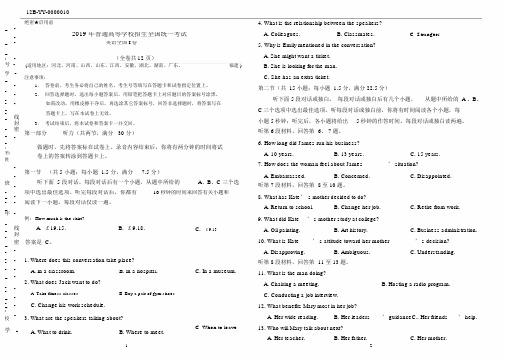
12B-YY-0000010-绝密★启用前__2019 年普通高等学校招生全国统一考试_-__-英语全国I卷__-(全卷共12 页):号 -(适用地区:河北、河南、山西、山东、江西、安徽、湖北、湖南、广东、福建 )学-注意事项:__-1.答卷前,考生务必将自己的姓名、考生号等填写在答题卡和试卷指定位置上。
___-2.回答选择题时,选出每小题答案后,用铅笔把答题卡上对应题目的答案标号涂黑。
___-如需改动,用橡皮擦干净后,再选涂其它答案标号,回答非选择题时,将答案写在___答题卡上,写在本试卷上无效。
_线__封3.考试结束后,将本试卷和答案卡一并交回。
__密_第一部分听力(共两节,满分 30 分)_-__做题时,先将答案标在试卷上。
录音内容结束后,你将有两分钟的时间将试:-名卷上的答案转涂到答题卡上。
姓--第一节(共 5 小题;每小题 1.5 分,满分7.5 分)-听下面 5 段对话。
每段对话后有一个小题,从题中所给的A、B、C 三个选班-__项中选出最佳选项。
听完每段对话后,你都有10 秒钟的时间来回答有关小题和_-__-阅读下一小题。
每段对话仅读一遍。
__4. What is the relationship between the speakers?A. Colleagues.B. Classmates.C. Strangers.5.Why is Emily mentioned in the conversation?A.She might want a ticket.B.She is looking for the man.C.She has an extra ticket.第二节(共 15小题;每小题 1.5分,满分 22.5分)听下面 5段对话或独白。
每段对话或独白后有几个小题,从题中所给的 A 、B、C三个选项中选出最佳选项。
听每段对话或独白前,你将有时间阅读各个小题,每小题 5秒钟;听完后,各小题将给出5秒钟的作答时间。
2019年高考全国卷Ⅱ英语试题(Word版含答案解析)

绝密★启用前2019年普通高等学校招生全国统一考试(全国卷II)英语注意事项:1.答卷前,考生务必将自己的姓名、准考证号填写在答题卡上。
2.回答选择题时,选出每小题答案后,用铅笔把答题卡上对应题目的答案标号涂黑。
如需改动,用橡皮擦干净后,再选涂其他答案标号。
回答非选择题时,将答案写在答题卡上,写在本试卷上无效。
3.考试结束后,将本试卷和答题卡一并交回。
第一部分听力(共两节,满分30分)做题时,先将答案标在试卷上。
录音内容结束后,你将有两分钟的时间将试卷上的答案转涂到答题卡上。
第一节(共5小题;每小题1.5分,满分7.5分)听下面5段对话。
每段对话后有一个小题,从题中所给的A、B、C三个选项中选出最佳选项。
听完每段对话后,你都有10秒钟的时间来回答有关小题和阅读下一小题。
每段对话仅读一遍。
例:How much is the shirt?A. £19.15.B. £9.18.C. £9.15.答案是C。
1. Where does the conversation probably take place?A. In a library.B. In a bookstore.C. In a classroom.2. How does the woman feel now?A. Relaxed.B. Excited.C. Tired.3. How much will the man pay?A. $520.B. $80.C. $100.4. What does the man tell Jane to do?A. Postpone his appointment.B. Meet Mr. Douglas.C. Return at 3 o’clock.5. Why would David quit his job?A. To go back to school.B. To start his own firm.C. To work for his friend.第二节(共15小题;每小题1.5分,满分22.5分)听下面5段对话或独白。
2019年高考英语全国卷2-答案

2019年普通高等学校招生全国统一考试·全国Ⅱ卷英语答案解析第一部分听力1.【答案】B2.【答案】C3.【答案】B4.【答案】A5.【答案】C6.【答案】C7.【答案】A8.【答案】B9.【答案】A10.【答案】C11.【答案】B12.【答案】A13.【答案】C14.【答案】C15.【答案】B16.【答案】A17.【答案】C18.【答案】A19.【答案】B20.【答案】A第二部分阅读理解第一节A【文章大意】本文介绍了Jo Usmar最喜欢的四本书。
21.【答案】C【解析】由标题My Favourite Books以及第一段最后一句话"Here she picks her top reads"可知,文章是以Jo Usmar的口吻进行写作的。
故选C。
【考点】代词指代22.【答案】C【解析】根据After Dark 部分中的"It's about two sisters-Eri,a model who either won't or can't stop sleeping,and Mari,a young student"可知答案为C。
【考查能力】细节理解23.【答案】D【解析】根据Gone Girl部分中的"but the horor story is brilliant"可知答案为D。
【考查能力】细节理解B【文章大意】本文介绍作者自己参与并鼓励他人参与志愿者工作的经历,论述了志愿者工作的独特意义。
24.【答案】C【解析】根据第一段第一句"You can use me as a last resort(选择),and if nobody else volunteers,then I will do it"和第二段中的"the unwilling parent "可推断,这位家长不想做志愿者工作。
2019年高考 英语真题 (全国卷一) 完型填空 含答案
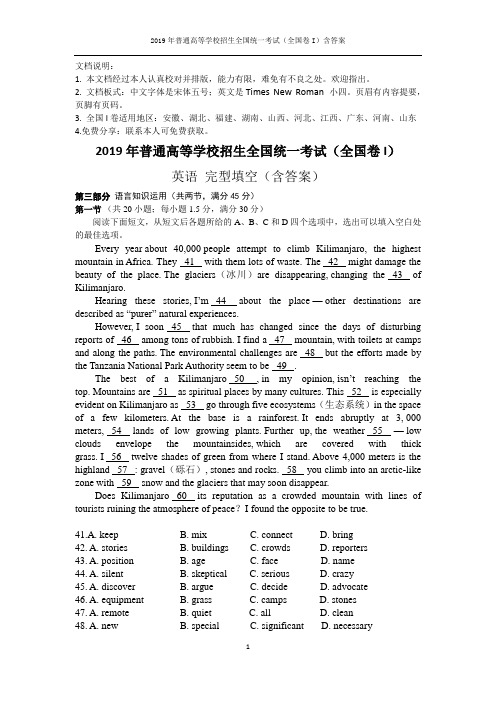
文档说明:1. 本文档经过本人认真校对并排版,能力有限,难免有不良之处。
欢迎指出。
2. 文档板式:中文字体是宋体五号;英文是Times New Roman 小四。
页眉有内容提要,页脚有页码。
3. 全国I卷适用地区:安徽、湖北、福建、湖南、山西、河北、江西、广东、河南、山东4.免费分享:联系本人可免费获取。
2019年普通高等学校招生全国统一考试(全国卷I)英语完型填空(含答案)第三部分语言知识运用(共两节,满分45分)第一节(共20小题;每小题1.5分,满分30分)阅读下面短文,从短文后各题所给的A、B、C和D四个选项中,选出可以填入空白处的最佳选项。
Every year about 40,000 people attempt to climb Kilimanjaro, the highest mountain in Africa. They 41 with them lots of waste. The 42 might damage the beauty of the place. The glaciers(冰川)are disappearing, changing the 43 of Kilimanjaro.Hearing these stories, I’m 44 about the place — other destinations are described as “purer” natural experiences.However, I soon 45 that much has changed since the days of disturbing reports of 46 among tons of rubbish. I find a 47 mountain, with toilets at camps and along the paths. The environmental challenges are 48 but the efforts made by the Tanzania National Park Authority seem to be 49 .The best of a Kilimanjaro 50 , in my opinion, isn’t reaching the top. Mountains are 51 as spiritual places by many cultures. This 52 is especially evident on Kilimanjaro as 53 go through five ecosystems(生态系统)in the space of a few kilometers. At the base is a rainforest. It ends abruptly at 3, 000 meters, 54 lands of low growing plants. Further up, the weather 55 — low clouds envelope the mountainsides, which are covered with thick grass. I 56 twelve shades of green from where I stand. Above 4,000 meters is the highland 57 : gravel(砾石), stones and rocks. 58 you climb into an arctic-like zone with 59 snow and the glaciers that may soon disappear.Does Kilimanjaro 60 its reputation as a crowded mountain with lines of tourists ruining the atmosphere of peace?I found the opposite to be true.41.A. keep B. mix C. connect D. bring42. A. stories B. buildings C. crowds D. reporters43. A. position B. age C. face D. name44. A. silent B. skeptical C. serious D. crazy45. A. discover B. argue C. decide D. advocate46. A. equipment B. grass C. camps D. stones47. A. remote B. quiet C. all D. clean48. A. new B. special C. significant D. necessary49. A. paying off B. spreading out C. blowing up D. fading away50. A. atmosphere B. experience C. experiment D. sight51. A. studied B. observed C. explored D. regarded52. A. view B. quality C. reason D. purpose53. A. scientists B. climbers C. locals D. officials54. A. holding on to B. going back to C. living up to D. giving way to55. A. changes B. clears C. improves D. permits56. A. match B. imagine C. count D. add57. A. village B. desert C. road D. lake58. A. Obviously B. Easily C. Consequently D. Finally59. A. permanent B. little C. fresh D. artificial60. A. enjoy B. deserve C. save D. acquire2019年普通高等学校招生全国统一考试英语试题参考答案第三部分语言知识运用41. D 42. C 43. C 44. B 45. A46. C 47. D 48. C 49. A 50. B51. D 52. A 53. B 54. D 55. A56. C 57. B 58. D 59. A 60. B。
河北省2019年高考英语试题及答案汇总(word版)(最新)
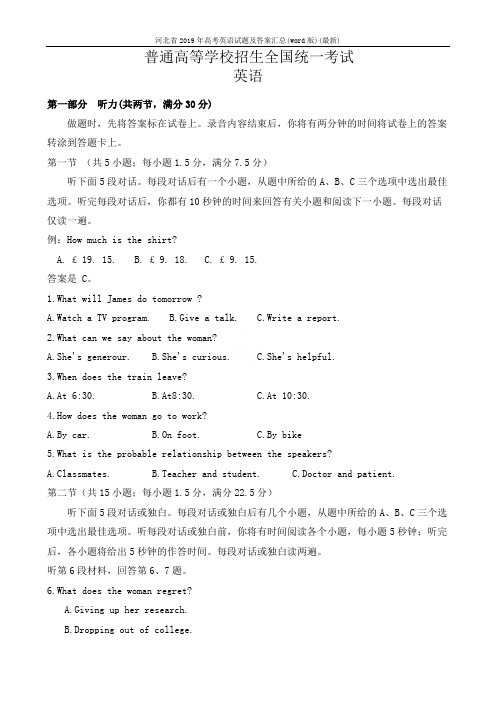
普通高等学校招生全国统一考试英语第一部分听力(共两节,满分30分)做题时,先将答案标在试卷上。
录音内容结束后,你将有两分钟的时间将试卷上的答案转涂到答题卡上。
第一节(共5小题;每小题1.5分,满分7.5分)听下面5段对话。
每段对话后有一个小题,从题中所给的A、B、C三个选项中选出最佳选项。
听完每段对话后,你都有10秒钟的时间来回答有关小题和阅读下一小题。
每段对话仅读一遍。
例:How much is the shirt?A. £ 19. 15.B. £ 9. 18.C. £ 9. 15.答案是 C。
1.What will James do tomorrow ?A.Watch a TV program.B.Give a talk.C.Write a report.2.What can we say about the woman?A.She's generour.B.She's curious.C.She's helpful.3.When does the train leave?A.At 6:30.B.At8:30.C.At 10:30.4.How does the woman go to work?A.By car.B.On foot.C.By bike5.What is the probable relationship between the speakers?A.Classmates.B.Teacher and student.C.Doctor and patient.第二节(共15小题;每小题1.5分,满分22.5分)听下面5段对话或独白。
每段对话或独白后有几个小题,从题中所给的A、B、C三个选项中选出最佳选项。
听每段对话或独白前,你将有时间阅读各个小题,每小题5秒钟;听完后,各小题将给出5秒钟的作答时间。
每段对话或独白读两遍。
听第6段材料,回答第6、7题。
2019年高考全国Ⅰ卷英语真题(含答案)
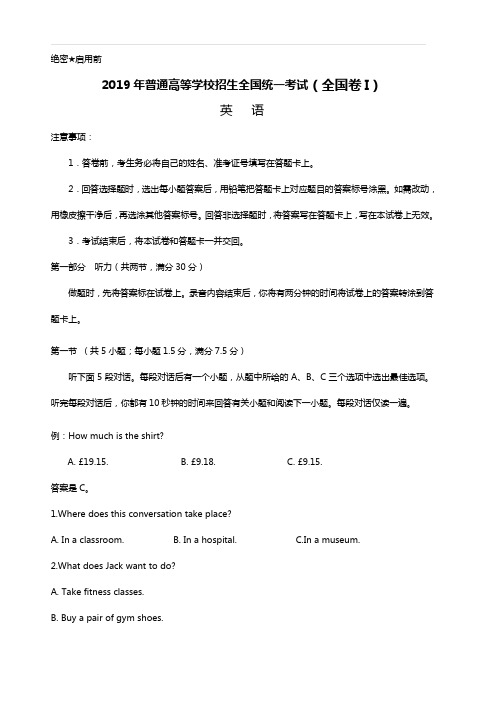
绝密★启用前2019年普通高等学校招生全国统一考试(全国卷I)英语注意事项:1.答卷前,考生务必将自己的姓名、准考证号填写在答题卡上。
2.回答选择题时,选出每小题答案后,用铅笔把答题卡上对应题目的答案标号涂黑。
如需改动,用橡皮擦干净后,再选涂其他答案标号。
回答非选择题时,将答案写在答题卡上,写在本试卷上无效。
3.考试结束后,将本试卷和答题卡一并交回。
第一部分听力(共两节,满分30分)做题时,先将答案标在试卷上。
录音内容结束后,你将有两分钟的时间将试卷上的答案转涂到答题卡上。
第一节(共5小题;每小题1.5分,满分7.5分)听下面5段对话。
每段对话后有一个小题,从题中所给的A、B、C三个选项中选出最佳选项。
听完每段对话后,你都有10秒钟的时间来回答有关小题和阅读下一小题。
每段对话仅读一遍。
例:How much is the shirt?A. £19.15.B. £9.18.C. £9.15.答案是C。
1.Where does this conversation take place?A. In a classroom.B. In a hospital.C.In a museum.2.What does Jack want to do?A. Take fitness classes.B. Buy a pair of gym shoes.C. Change his work schedule.3.What are the speakers talking about?A. What to drink.B. Where to meet.C. When to leave.4.What is the relationship between the speakers?A. Colleges.B. Classmates.C. Strangers.5.Why is Emily mentioned in the conversation?A. She might want a ticket.B. She is looking for the man.C. She has an extra ticket.第二节(共15小题,每小题1.5分,满分22.5分)听下面5段对话或独白。
2019年全国一卷高考英语听力答案原文材料-19年全国一卷听力
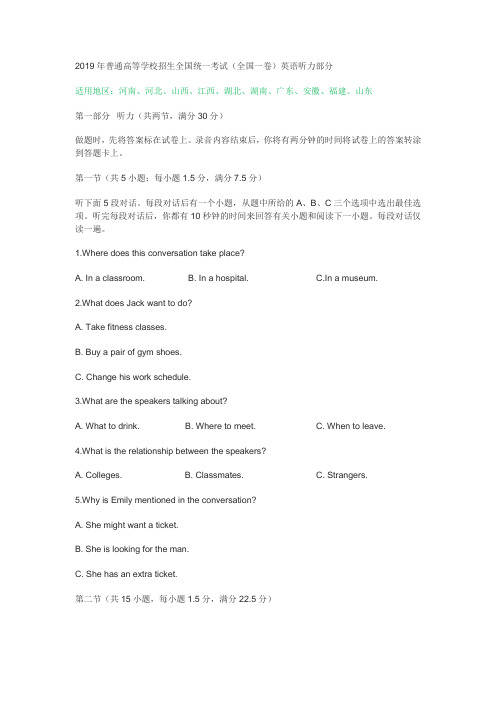
2019年普通高等学校招生全国统一考试(全国一卷)英语听力部分适用地区:河南、河北、山西、江西、湖北、湖南、广东、安徽、福建、山东第一部分听力(共两节,满分30分)做题时,先将答案标在试卷上。
录音内容结束后,你将有两分钟的时间将试卷上的答案转涂到答题卡上。
第一节(共5小题;每小题1.5分,满分7.5分)听下面5段对话。
每段对话后有一个小题,从题中所给的A、B、C三个选项中选出最佳选项。
听完每段对话后,你都有10秒钟的时间来回答有关小题和阅读下一小题。
每段对话仅读一遍。
1.Where does this conversation take place?A. In a classroom.B. In a hospital.C.In a museum.2.What does Jack want to do?A. Take fitness classes.B. Buy a pair of gym shoes.C. Change his work schedule.3.What are the speakers talking about?A. What to drink.B. Where to meet.C. When to leave.4.What is the relationship between the speakers?A. Colleges.B. Classmates.C. Strangers.5.Why is Emily mentioned in the conversation?A. She might want a ticket.B. She is looking for the man.C. She has an extra ticket.第二节(共15小题,每小题1.5分,满分22.5分)听下面5段对话或独白。
每段对话或独白后有几个小题,从题中所给的A、B、C三个选项中选出最佳选项。
2019年河北高考英语试卷及答案(已公布)

2019年河北高考英语试卷及答案(已公布)【导语】2019年河北高考英语试卷及答案已公布,河北高考英语试卷及答案具体如下:
2019年河北高考英语试卷
2019年河北高考英语答案
成绩查询
2019年高考成绩查询一般从6月下旬开始陆续公布,各地成绩查询时间不同,考生可登陆当地教育考试院网站查询高考成绩。
也可进入无忧考网高考成绩查询专题查询,我们会在公布更新各地高考成绩查询时间及方式。
全国2019年高考成绩查询时间及入口专题点击进入
录取分数线
2019年高考录取分数线一般从6月下旬开始陆续公布,各地分数线公布时间不同,可登陆当地教育考试院网站查看高考录取分数线。
也可进入无忧考网高考录取分数线专题查询,我们会在公布更新各地高考录取分数线信息。
全国2019年高考录取分数线专题点击进入。
2019年高考全国Ⅲ卷英语真题(含答案)

2019年普通高等学校招生全国统一考试(全国卷III)英语第一部分听力(共两节,满分30分)做题时,先将答案标在试卷上。
录音内容结束后,你将有两分钟的时间将试卷上的答案转涂到答题卡上。
第一节(共5小题;每小题1.5分,满分7.5分)听下面5段对话。
每段对话后有一个小题,从题中所给的A、B、C三个选项中选出最佳选项。
听完每段对话后,你都有10秒钟的时间来回答有关小题和阅读下一小题。
每段对话仅读一遍。
例:How much is the shirt?A. £19.15.B. £9.18.C. £9.15.答案是C。
第一节(共5小题;每小题1.5分,满分7.5分)听下面5段对话。
每段对话后有一个小题,从题中所给的A、B、C三个选项中选出最佳选项。
听完每段对话后,你都有10秒钟的时间来回答有关小题和阅读下一小题。
每段对话仅读一遍。
例:How much is the shirt?A. £19.15.B. £9.18.C. £9.15.答案是C。
1. Where does the conversation probably take place?A. In a library.B. In a bookstore.C. In a classroom.2. How does the woman feel now?A. Relaxed.B. Excited.C. Tired.3. How much will the man pay?A. $520.B. $80.C. $100.4. What does the man tell Jane to do?A. Postpone his appointment.B. Meet Mr. Douglas.C. Return at 3 o’clock.5. Why would David quit his job?A. To go back to school.B. To start his own firm.C. To work for his friend. 第二节(共15小题;每小题1.5分,满分22.5分)听下面5段对话或独白。
2019年高考英语全国卷3-答案

2019年普通高等学校招生全国统一考试(全国Ⅲ卷)英语答案解析第一部分阅读理解第一节A【文章大意】本文主要预告了四出戏剧的梗概及演出信息。
1.【答案】A【解析】根据第一出戏剧的名称Animals Out of Paper及该部分中的"Productions and the Great Griffon present the play by Rajiv Joseph, in which an origami(折纸术)artist invites a teenage talent and his teacher into her studio"可知答案。
【考点】细节理解2.【答案】D【解析】题干问的是"谁执导了The Audience?"。
根据该部分中的"Stephen Daldry directs"可知答案。
【考点】细节理解3.【答案】C【解析】根据第三出戏剧Hamilton首句"Lin-Manuel Miranda wrote this musical about Alexander Hamilton, in which the birth of America is presented as an immigrant story"可知,Hamilton是关于美国历史的戏剧。
【考点】细节理解B【文章大意】本文以国外视角介绍中国文化及中国美学对国际时尚的影响,展现了中国对国际时尚和设计发展的引领作用。
4.【答案】B【解析】根据第三段最后一句"The exhibition had record attendance, showing that there is huge interest in Chinese influences"可知,这次在纽约的展览拥有破纪录的出席人数,故选B。
【考点】细节理解5.【答案】A【解析】根据第四段中的"Chinese models are the faces of beauty and fashion campaigns that sell dreams to women all over the world, which means Chinese women are not just consumers of fashion-they are central to is movement"可知,中国女性不仅是时尚的消费者,她们还是时尚发展的核心。
2019年高考英语全国卷答案
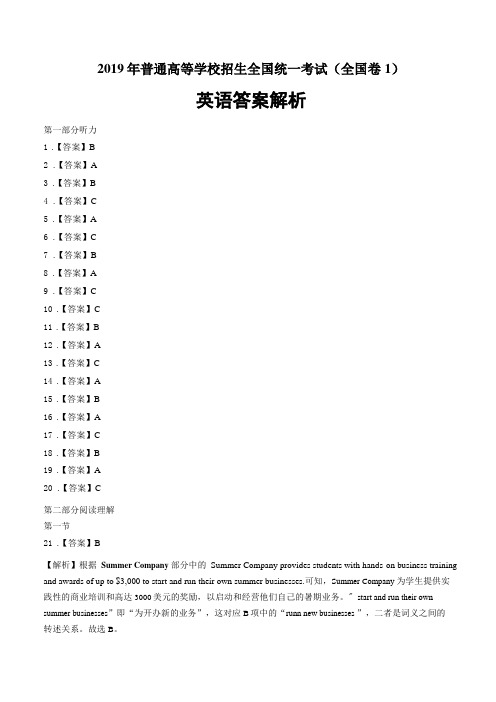
2019年普通高等学校招生全国统一考试(全国卷1)英语答案解析第一部分听力1.【答案】B2.【答案】A3.【答案】B4.【答案】C5.【答案】A6.【答案】C7.【答案】B8.【答案】A9.【答案】C10.【答案】C11.【答案】B12.【答案】A13.【答案】C14.【答案】A15.【答案】B16.【答案】A17.【答案】C18.【答案】B19.【答案】A20.【答案】C第二部分阅读理解第一节21.【答案】B【解析】根据Summer Company 部分中的Summer Company provides students with hands-on business training and awards of up to $3,000 to start and run their own summer businesses.可知,Summer Company 为学生提供实践性的商业培训和高达3000美元的奖励,以启动和经营他们自己的暑期业务。
" start and run their own summer businesses”即“为开办新的业务”,这对应B项中的“runn new businesses ”,二者是词义之间的转述关系。
故选B。
【考点】细节理解22.【答案】D【解析】根据Stewardship Youth Ranger Program部分中Who is eligible: Students aged 16 or 17 at time of hire, but not turning 18 before December 31 this yeailT知,符合条件的学生是16岁或17岁的学生,但在今年12月31日之前未满18岁。
由此得出,这个项目要求年龄在16-17岁之间。
故选D。
【考点】细节理解23.【答案】D【解析】根据Summer Employment Opportunities部分中最后一句Some positions require students to be 15 to 24 or up to 29 for persons with a disability可知,Summer Employment Opportunities有些职位是给残疾人的。
2019年高考英语全国卷2(真题+答案+解析)

2019年全国统一高考英语试卷(全国2卷)注意事项:1、答卷前,考生务必将自己的姓名、准考证号填写在答题卡上。
2、回答选择题时,选出每小题答案后,用铅笔把答题卡上对应题目的答案标号涂黑。
如需改动,用橡皮擦干净后,再选涂其他答案标号。
回答非选择题时,将答案写在答题卡上。
写在本试卷上无效。
3、考试结束后,将本试卷和答题卡一并交回。
第一部分听力(共两节)第一节(共5小题;每小题1.5分,满分7.5分)听下面5段对话。
每段对话后有一个小题,从题中所给的A、B、C三个选项中选出最佳选项.听完每段对话后,你都有10秒钟的时间来回答有关小题和阅读下一小题.每段对话仅读一遍.1.Where does the conversation probably take place?A.In a library.B.In a bookstore.C.In a classroom.2.How does the woman feel now?A.Relaxed.B.Excited.C.Tired.3.How much will the man pay?A.﹩20.B.﹩80.C.﹩100.4.What does the man tell Jane to do?A.Postpone his appointment.B.Meet Mr.Douglas.C.Return at 3 o'clock.5.Why would David quit his job?A.To go back to school.B.To start his own firm.C.To work for his friend.第二节(每小题1.5分,满分22.5分)听下面5段对话或独白.每段对话或独白后有几个小题,从题中所给的A、B、C三个选项中选出最佳选项.听每段对话或独白前,你将有时间阅读各个小题,每小题5秒钟;听完后,各小题将给出5秒钟的作答时间.每段对话或独白读两遍.6.听材料,回答下列问题.(1)What does the man want the woman to do?A.Check the cupboard.B.Clean the balcony.C.Buy an umbrella.(2)What is the probable relationship between the speakers?A.Husband and wife.B.Employer and employee.C.Shop assistant and customer.7.听材料,回答下列问题.(1)Where did the woman go at the weekend?A.The city centre.B.The forest park.C.The man's home.(2)How did the man spend his weekend?A.Packing for a move.B.Going out with Jenny.C.Looking for a new house.(3)What will the woman do for the man?A.Take Henry to hospital.B.Stay with his kid.C.Look after his pet.8.听材料,回答下列问题.(1)What is Mr.Stone doing now ?A.Eating lunch.B.Having a meeting.C.Writing a diary.(2)Why does the man want to see Mr.Stone?A.To discuss a program.B.To make a travel plan.C.To ask for sick leave.(3)When will the man meet Mr.Stone this afternoon?A.At 3:00.B.At 3:30.C.At 3:45.9.听材料,回答下列问题.(1)What are the speakers talking about?A.A company.B.An interview.C.A job offer.(2)Who is Monica Stansfield?A.A junior specialist.B.A department manager.C.A sales assistant.(3)When will the man hear from the woman?A.On Tuesday.B.On Wednesday.C.On Thursday.10.听材料,回答下列问题.(1)What did John enjoy doing in his childhood?A.Touring France.B.Playing outdoors.C.Painting pictures.(2)What did John do after he moved to the US?A.He did business.B.He studied biology.C.He worked on a farm.(3)Why did John go hunting?A.For food.B.For pleasure.C.For money.(4)What is the subject of John's works?A.American birds.B.Natural scenery.C.Family life.第二部分阅读理解(共两节)第一节(满分30分)阅读下列短文,从每题所给的A、B、C和D四个选项中,选出最佳选项.AMy Favourite BooksJo Usmar is a writer for Cosmopolitan and co﹣author of the This Book Will series(系列)of lifestyle books.Here she picks her top reads.MatildaRoald DahlI once wrote a paper on the influence of fairy tales on Roald Dahl's writing and it gave me a new appreciation for his strange and delightful worlds.Matilda's battles with her cruel parents and the bossy headmistress,Miss Trunchbull,are equally funny and frightening,but they're also aspirational.After DarkHaruki MurakamiIt's about two sisters ﹣Eri,a model who either won't or can′t stop sleeping,and Mari,a young student.In trying to connect to her sister,Mari starts changing her life and discovers a world of diverse "night people" who are hiding secrets.Gone GirlGillian FlynnThere was a bit of me that didn′t want to love this when everyone else on the planet did,butthe horror story is brilliant.There's tension and anxiety from the beginning as Nick and Amy battle for your trust.It's a real whodunit and the frustration when you realise what's going on is horribly enjoyable.The StandStephen KingThis is an excellent fantasy novel from one of the best storytellers around.After a serious flu outbreak wipes out 99.4% of the world′s population,a battle unfolds between good and evil among those left.Randall Flagg is one of the scariest characters ever.(1)Who does "I" refer to in the text?A.Stephen King.B.Gillian Flynn.C.Jo Usmar.D.Roald Dahl.(2)Which of the following tells about Mari and Eri?A.Cosmopolitan.B.Matilda.C.After Dark.D.The Stand.(3)What kind of book is Gone Girl?A.A folk tale.B.A biography.C.A love story.D.A horror story.B"You can use me as a last resort(选择),and if nobody else volunteers,then I will do it."This was an actual reply from a parent after I put out a request for volunteers for my kids' lacrosse(长曲棍球)club.I guess that there's probably some demanding work schedule,or social anxiety around stepping up to help for an unknown sport.She may just need a little persuading.So I try again and tug at the heartstrings.I mention the single parent with four kids running the show and I talkabout the dad coaching a team that his kids aren't even on…At this point the unwilling parent speaks up,"Alright.Yes,I'll do it."I'm secretly relieved because I know there's real power in sharing volunteer responsibilities among many.The unwilling parent organizes the meal schedule,sends out emails,and collects money for end﹣of﹣season gifts.Somewhere along the way,the same parent ends up becoming an invaluable member of the team.The coach is able to focus on the kids while the other parents are relieved to be off the hook for another season.Handing out sliced oranges to bloodthirsty kids can be as exciting as watching your own kid score a goal.Still, most of us volunteers breathe a sigh of relief when the season comes to a close.That relief is coupled with a deep understanding of why the same people keep coming back for more:Connecting to the community (社区)as you freely give your time,money,skills,or services provides a real joy. V olunteering just feels so good.In that sense, I'm pretty sure volunteering is more of a selfish act than I'd freely like to admit. However, if others benefit in the process, and I get some reward too, does it really matter where my motivation lies?(1)What can we infer about the parent from her reply in paragraph 1?A.She knows little about the club.B.She isn't good at sports.C.She just doesn't want to volunteer.D.She's unable to meet her schedule.(2)What does the underlined phrase"tug at the heartstrings"in paragraph 2 mean?A.Encourage teamwork.B.Appeal to feelings.C.Promote good deeds.D.Provide advice.(3)What can we learn about the parent from paragraph 3?A.She gets interested in lacrosse.B.She is proud of her kids.C.She'll work for another season.D.She becomes a good helper.(4)Why does the author like doing volunteer work?A.It gives her a sense of duty.B.It makes her very happy.C.It enables her to work hard.D.It brings her material rewards.CMarian Bechtel sits at West Palm Beach's Bar Louie counter by herself,quietly reading her e﹣book as she waits for her salad.What is she reading?None of your business! Lunch is Bechtel's "me" time.And like more Americans,she's not alone.A new report found 46 percent of meals are eaten alone in America.More than half(53 percent)have breakfast alone and nearly half(46 percent)have lunch by themselves.Only at dinnertime are we eating together anymore,74 percent,according to statistics from the report."I prefer to go out and be out.Alone,but together,you know?" Bechtel said,looking up from her book.Bechtel,who works in downtown West Palm Beach,has lunch with coworkers sometimes,but like many of us,too often works through lunch at her desk.A lunchtime escape allows her to keep a boss from tapping her on the shoulder.She retuns to work feeling energized."Today,I just wanted some time to myself,"she said.Just two seats over,Andrew Mazoleny,a local videographer,is finishing his lunch at the bar.He likes that he can sit and check his phone in peace or chat up the barkeeper with whom he's on a first﹣name basis if he wants to have a little interaction(交流)."I reflect on how my day's gone and think about the rest of the week,"he said,"It's a chance for self﹣reflection.You return to work recharged and with a plan."That freedom to choose is one reason more people like to eat alone.There was a time when people may have felt awkward about asking for a table for one,but those days are over.Now,we have our smartphones to keep us company at the table."It doesn't feel as alone as it may have before all the advances in technology," said Laurie Demeritt,whose company provided the statistics for the report.(1)What are the statistics in paragraph 2 about?A.Food variety.B.Eating habits.C.Table manners.D.Restaurant service.(2)Why does Bechtel prefer to go out for lunch?A.To meet with her coworkers.B.To catch up with her work.C.To have some time on her own.D.To collect data for her report.(3)What do we know about Mazoleny?A.He makes videos for the bar.B.He's fond of the food at the bar.C.He interviews customers at the bar.D.He's familiar with the barkeeper.(4)What is the text mainly about?A.The trend of having meals alone.B.The importance of self﹣reflection.C.The stress from working overtime.D.The advantage of wireless technology.DBacteria are an annoying problem for astronauts.The microorganisms(微生物)from our bodies grow uncontrollably on surfaces of the International Space Station,so astronauts spend hours cleaning them up each week.How is NASA overcoming this very tiny big problem?It's turning to a bunch of high school kids.But not just any kids.It is depending on NASA HUNCH high school classrooms,like the one science teachers Gene Gordon and Donna Himmelberg lead at Fairport High School in Fairport,New York.HUNCH is designed to connect high school classrooms with NASA engineers.For the past two years,Gordon's students have been studying ways to kill bacteria in zero gravity,and they think they're close to a solution(解决方案)."We don't give the students any breaks.They have to do it just like NASA engineers," says Florence Gold,a project manager."There are no tests,"Gordon says."There is no graded homework.There almost are no grades,other than ‘Are you working towards your goal ?' Basically,it's ‘I've got to producethis product and then,at the end of the year,present it to NASA.' Engineers come and really do an in﹣person review,and…it's not a very nice thing at times.It's a hard business review of your product."Gordon says the HUNCH program has an impact (影响)on college admissions and practical life skills."These kids are so absorbed in their studies that I just sit back.I don't teach."And that annoying bacteria?Gordon says his students are emailing daily with NASA engineers about the problem,readying a workable solution to test in space.(1)What do we know about the bacteria in the International Space Station?A.They are hard to get rid of.B.They lead to air pollution.C.They appear in different forms.D.They damage the instruments.(2)What is the purpose of the HUNCH program?A.To strengthen teacher﹣student relationships.B.To sharpen students' communication skills.C.To allow students to experience zero gravity.D.To link space technology with school education.(3)What do the NASA engineers do for the students in the program?A.Check their product.B.Guide project designs.C.Adjust work schedules.D.Grade their homework.(4)What is the best title for the text?A.NASA:The Home of AstronautsB.Space:The Final Homework FrontierC.Nature:An Outdoor ClassroomD.HUNCH:A College Admission Reform第二节(满分10分)根据短文内容,从短文后的选项中选出能填入空白处的最佳选项.选项中有两项为多余选项.Imagine a child standing on a diving board four feet high and asking himself the question:"Should I jump?" This is what motivation or the lack of it can do.Motivation and goal setting are the two sides of the same coin.(1).Like the child on the diving board,you will stay undecided.(2).More than that,how should you stay motivated to achieve the goal?First,you need to evaluate yourself,your values,your strengths,your weaknesses,your achievements,your desires,etc.Only then should you set your goals.You also need to judge the quality and depth of your motivation.This is quite important,because it is directly related to your commitment.There are times when your heart is not in your work.(3).So,slow down and think what you really want to do at that moment.Clarity (清晰)of thoughts can help you move forward.Another way of setting realistic goals is to analyze your short and long term objectives,keeping in mind your beliefs,values and strengths.Remember that goals are flexible.(4).They also need to be measurable.You must keep these points in mind while setting your goals.Your personal circumstances are equally important.For example,you may want to be a pilot but can't become one because your eyesight is not good enough.(5).You should reassess your goals,and motivate yourself to set a fresh goal.You will surely need to overcome some difficulties,some planned,but most unplanned.You cannot overcome them without ample motivation.Make sure that you plan for these difficulties at the time of setting your goals.A.This can affect your work.B.So how should you motivate yourself?C.However,this should not discourage you.D.So why should we try to set specific goals?E.They can change according to circumstances.F.Motivation is what you need most to do a good job.G.Without motivation,you can neither set a goal nor reach it.第三部分语言知识运用(共两节)第一节(每小题1.5分,满分30分)阅读下面短文,从短文后各题所给的A、B、C和D四个选项中,选出可以填入空白处的最佳选项.It's about 250 miles from the hills of west﹣central Iowa to Ehlers' home inMinnesota.During the long trip home,following a weekend of hunting,Ehlers(1)about the small dog he had seen (2)alongside the road.He had (3)to coax (哄)the dog to him but,frightened,it had (4).Back home,Ehlers was troubled by that (5)dog.So,four days later,he called his friend Greg,and the two drove (6).After a long and careful (7),Greg saw,across a field,the dog moving (8)away.Ehlers eventually succeeded in coaxing the animal to him.Nervousness and fear were replaced with (9).It just started licking (舔)Ehlers' face.A local farmer told them the dog sounded like one (10)as lost in the local paper.The ad had a (11)number for a town in southern Michigan.Ehlers (12)the number of Jeff and Lisa to tell them he had (13)their dog.Jeff had (14)in Iowa before Thanksgiving with his dog,Rosie,but the gun shots had scared the dog off.Jeff searched (15)for Rosie in the next four days.Ehlers returned to Minnesota,and then drove 100 miles to Minneapolis to put Rosie on a flight to Michigan."It's good to know there's still someone out there who (16)enough to go to that kind of (17)," says Lisa of Ehlers' rescue (18)."I figured whoever lost the dog was probably just as (19)to it as I am to my dogs,"says Ehlers."If it had been my dog,I'd hope that somebody would be (20)to go that extra mile."(1)A.read B.forgot C.thought D.heard(2)A.fighting B.trembling C.eating D.sleeping(3)A.tried B.agreed C.promised D.regretted(4)A.calmed dow B.stood up C.rolled over D.run off(5)A.injured B.stolen C.lost D.rescued(6)A.home B.past C.back D.on(7)A.preparation B.explanation C.test D.search(8)A.cautiously B.casually C.skillfully D.angrily(9)A.surprise B.joy C.hesitation D.anxiety(10)A.predicted B.advertised C.believed D.recorded(11)A.house B.phone C.street D.car(12)A.called B.copied C.counted D.remembered(13)A.fed B.adopted C.found D.cured(14)A.hunted B.skied C.lived D.worked(15)A.on purpose B.on time C.in turn D.in vain(16)A.cares B.sees C.suffers D.learns(17)A.place B.trouble C.waste D.extreme(18)A.service B.plan C.effort D.team(19)A.equal B.allergic C.grateful D.close(20)A.suitable B.proud C.wise D.willing第二节(每小题1.5分,满分15分)阅读下面短文,在空白处填入1个适当的单词或括号内单词的正确形式。
2019年高考英语全国卷1含答案解析
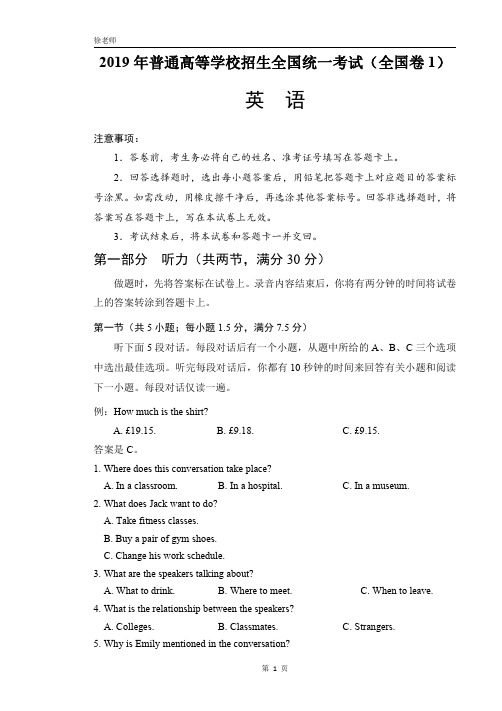
徐老师2019年普通高等学校招生全国统一考试(全国卷1)英语注意事项:1.答卷前,考生务必将自己的姓名、准考证号填写在答题卡上。
2.回答选择题时,选出每小题答案后,用铅笔把答题卡上对应题目的答案标号涂黑。
如需改动,用橡皮擦干净后,再选涂其他答案标号。
回答非选择题时,将答案写在答题卡上,写在本试卷上无效。
3.考试结束后,将本试卷和答题卡一并交回。
第一部分听力(共两节,满分30分)做题时,先将答案标在试卷上。
录音内容结束后,你将有两分钟的时间将试卷上的答案转涂到答题卡上。
第一节(共5小题;每小题1.5分,满分7.5分)听下面5段对话。
每段对话后有一个小题,从题中所给的A、B、C三个选项中选出最佳选项。
听完每段对话后,你都有10秒钟的时间来回答有关小题和阅读下一小题。
每段对话仅读一遍。
例:How much is the shirt?A.£19.15.B.£9.18.C.£9.15.答案是C。
1.Where does this conversation take place?A.In a classroom.B.In a hospital.C.In a museum.2.What does Jack want to do?A.Take fitness classes.B.Buy a pair of gym shoes.C.Change his work schedule.3.What are the speakers talking about?A.What to drink.B.Where to meet.C.When to leave.4.What is the relationship between the speakers?A.Colleges.B.Classmates.C.Strangers.5.Why is Emily mentioned in the conversation?第1页A.She might want a ticket.B.She is looking for the man.C.She has an extra ticket.第二节(共15小题,每小题1.5分,满分22.5分)听下面5段对话或独白。
高考英语河北试卷真题

高考英语河北试卷真题2019年高考英语河北卷真题Part I Listening Comprehension (30 marks)Section ADirections: In Section A, you will hear ten short conversations between two speakers. At the end of each conversation, a question will be asked about what was said. The conversations and the questions will be spoken only once. After you hear a conversation and the question about it, read the four possible answers on your paper, and decide which one is the best answer to the question you have heard.1. A. An athlete. B. A traveler. C. A policeman. D. A guard.2. A. At 7:15. B. At 7:30. C. At 7:45. D. At 8:00.3. A. Rainy. B. Cloudy. C. Windy. D. Sunny.4. A. A company party. B. A family gathering. C. A school celebration.D. A small party.5. A. A waitress. B. A visitor. C. A receptionist. D. A travel agent.6. A. It’s in full swing. B. It’s coming to an end.C. It hasn’t started yet. D. It’s been postponed.7. A. 12. B. 23. C. 31. D. 40.8. A. Delighted. B. Surprised. C. Displeased. D. Satisfied.9. A. A book. B. A magazine. C. A report. D. A map.10. A. She’ll check the definition of “scan”. B. She’ll go to administrative office this afternoon. C. She’ll fill out the form for the woman. D. She’ll give a lecture on scanning technology.Section BDirections: In Section B, you will hear two long conversations. At the end of each conversation, you will hear four questions. Both the conversation and the questions will be spoken only once. After you hear a question, read the four possible answers on your paper, and decide which one is the best answer to the question you have heard.Conversation One11. A. Worried. B. Depressed. C. Pleased. D. Amazed.12. A. At the airport. B. At the bus stop. C. At the railway station. D. At the taxi stand.13. A. 6:45. B. 7:05. C. 7:25. D. 7:45.14. A. To queue up to buy some stamps. B. To take a bus to the airport.C. To meet Jane at the supermarket.D. To buy a camera.Conversation Two15. A. In the library. B. In the café. C. In the garden. D. In the restaurant.16. A. 30%. B. 20%. C. 40%. D. 50%.17. A. A designer. B. A photographer. C. An artist. D. A writer.18. A. Body painting. B. Henna tattoo. C. Hand-drawn pottery. D. Watercolor painting.Part II Reading Comprehension (40 marks)Section ADirections: For Questions 19–22, read the following passage and answer the questions.Speech, after all, is a doorway into the world. Every spoken word holds within it the possibility of another world, another version of the speaker. It can tell us not only about the content of thought but also about the thought process itself.19. According to the passage, what can speech do?A. Give us a glimpse into the speaker’s mind.B. Provide us with endless possibilities.C. Present various versions of the speaker.D. Reveal the content of thoughts.20. How does the author view speech?A. As a form of self-expression.B. As a tool for communication.C. As a chance to show off.D. As a barrier to understanding.21. What can be inferred about the author?A. The author is fascinated by written language.B. The author believes in the power of speech.C. The author dislikes talking with people.D. The author is an expert in linguistics.22. What are we told about spoken words in the passage?A. They can transport us to another planet.B. They reveal the speaker’s true intentions.C. They can shed light on the speaker’s inner world.D. They can be used to manipulate others.For Questions 23–26, read the following passage and complete the statements.Teaching machines are everywhere around us but the classroom, where teachers spend every day with the same age group with the same subject is the only place where this technology is not used.23. The passage suggests that teaching machines have been widely used except in ________.24. Teachers often teach students who are the same ________ in the classroom.25. The idea introduces teaching ________ by replacing the traditional forms of teaching.26. People’s attitudes to ________ are changing due to fast developments in the technological industry.Section BDirections: For Questions 27–31, read the following passage and answer the questions.Trapped in our cities, often with only limited access to the natural world, we turn to our pets for a taste of the wild. Or do we? How wild is this so-called wildness?27. What do people generally turn to their pets for, according to the passage?28. What is meant by “this so-called wildness”?29. What is suggested to bring one closer to nature?30. How is the relationship between humans and their pets described in the passage?31. What is implied in the passage about people living in cities?Section CDirections: For Questions 32–35, read the following passage and answer the questions.People love making comparisons between sports and life. I often spend my weekends in the pool, and while swimming, I notice how life’s a lot like swimming.32. What is often compared by people in the passage?33. According to the author, what is swimming a lot like?34. What does the author do on weekends?35. What can be inferred about the author from the passage?Part III Writing (30 marks)Directions: For this part, you are allowed 30 minutes to write an essay commenting on the saying “Never put off until tomorrow what can be done today.” You can cite examples to illustrate your views. You should writ e at least 150 words but no more than 200 words.2019年高考英语河北卷真题结束以上是2019年高考英语河北卷的听力、阅读和写作部分。
河北省2019年英语高考真题以及答案

绝密★启用前河北省2019年英语高考试卷(含答案)注意事项:1.答卷前,考生务必将自己的姓名、准考证号填写在答题卡上。
2.回答选择题时,选出每小题答案后,用铅笔把答题卡上对应题目的答案标号涂黑。
如需改动,用橡皮擦干净后,再选涂其他答案标号。
回答非选择题时,将答案写在答题卡上,写在本试卷上无效。
3.考试结束后,将本试卷和答题卡一并交回。
第一部分听力(共两节,满分30分)做题时,先将答案标在试卷上。
录音内容结束后,你将有两分钟的时间将试卷上的答案转涂到答题卡上。
第一节(共5小题;每小题1.5分,满分7.5分)听下面5段对话。
每段对话后有一个小题,从题中所给的A、B、C三个选项中选出最佳选项。
听完每段对话后,你都有10秒钟的时间来回答有关小题和阅读下一小题。
每段对话仅读一遍。
例:How much is the shirt?A. £19.15.B. £9.18.C. £9.15.答案是C。
1.Where does this conversation take place?A. In a classroom.B. In a hospital.C.In a museum.2.What does Jack want to do?A. Take fitness classes.B. Buy a pair of gym shoes.C. Change his work schedule.3.What are the speakers talking about?A. What to drink.B. Where to meet.C. When to leave.4.What is the relationship between the speakers?A. Colleges.B. Classmates.C. Strangers.5.Why is Emily mentioned in the conversation?A. She might want a ticket.B. She is looking for the man.C. She has an extra ticket.第二节(共15小题,每小题1.5分,满分22.5分)听下面5段对话或独白。
